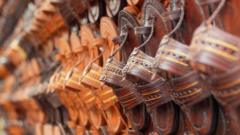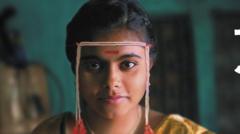Local artisans in Kolhapur retaliate against Prada's alleged appropriation of their traditional footwear, seeking respect and fair compensation amidst cultural preservation efforts.
**Kolhapur Artisans Challenge Prada Over Design Theft of Traditional Sandals**

**Kolhapur Artisans Challenge Prada Over Design Theft of Traditional Sandals**
Struggles for recognition grow after luxury brand's footwear releases similar designs to handmade crafts.
In the historical town of Kolhapur, Maharashtra, a wave of outrage has erupted among local artisans as luxury fashion giant Prada faces accusations of plagiarizing the town's signature leather sandals. These traditional Kolhapuri sandals, with craftsmanship dating back to the 12th Century, have been a part of the community's heritage, made by around 5,000 artisans who handcraft these items under challenging working conditions.
Sadashiv Sanake, a seasoned artisan aged 58, reflects on the painstaking effort involved in creating these sandals, noting that he can produce only eight to ten pairs each day. These locally made pairs are sold at an average price of $8-10, contrasting sharply with Prada's counterparts, which could retail between £600 to £1,000 in the UK. Upon viewing Prada's new designs, Sanake humorously questioned their value, “Do they have gold in them?”
The uproar began after Prada debuted its lookalike sandals during Milan Fashion Week, sparking a robust response on social media regarding cultural appropriation. In light of the backlash, Prada issued a statement acknowledging the origins of the sandals, leading to support from local politicians and community organizations advocating for fair recognition of the artisans’ work.
Historically, Kolhapuri sandals were crafted by the marginalised Charmakar community, an integral part of the local culture that flourished under royal patronage in the early 20th Century. However, the industry currently struggles with low wages, high material costs, and fierce competition from synthetic alternatives. Artisans contend that current prices for authentic sandals are increasingly unviable due to factors such as rising leather costs, which have surged since bans on cattle slaughter were enforced.
Women artisans, known for their intricate engraving work, often earn meagre wages, leading many families to reconsider passing down the craft. The plight of these artisans highlights the pressing need for systemic support to protect their heritage and rights, particularly against imitation by global brands.
Though a Geographical Indication status protects Kolhapuri sandals within India, global implications remain unregulated. Experts suggest advocating for intellectual property protection on a global scale, yet the process can be complex and costly. MCCIA has initiated plans to patent the sandal’s design, while calls for ethical recognition and profit-sharing with the artisans increase.
Nonetheless, some industry representatives, like Lalit Gandhi, suggest that Prada’s acknowledgment may ultimately raise the profile and value of Kolhapuri sandals, potentially benefiting the artisans if they receive a fair share of profits. As the conversation around cultural heritage and fair trade continues, a court plea seeking damages from Prada and promoting collaboration with artisans indicates that the battle for fair representation in the fashion industry is far from over. Discussions between Prada and local representatives are anticipated soon as discussions about the future of the craft carry on.























